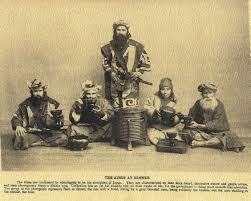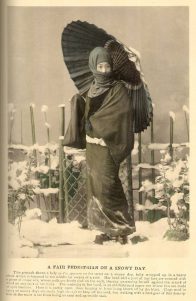Ogawa Kazumasa and Japanese Photography (1860-1929): Mirage and Ghosts of the Past
Lee Jay Walker
Modern Tokyo Times
The photography of Ogawa Kazumasa (1860-1929) provides a glimpse into the changing reality of Japan. After all, he was born in the late Edo era but his childhood belongs to the revolutionary period of the Meiji period that began in1868. However, the international arena was changing rapidly because of militant nationalism and radical socialism. This highly political period was also felt deeply in Japan but somehow certain images by Kazumasa would escape this reality.
Indeed, the power of Kazumasa is that he provides an image into the old world whereby culture and a normal way of life exist outside of the revolutionary period. Of course, this may have been the intention of Kazumasa because not all individuals were happy with the speed of events. Similarly, it may well be based on purely commercial reasons or because of personal interests related to the photographer.
Either way, the rapid modernization of the Meiji period seems amiss because of the simplicity of the themes chosen by Kazumasa. On top of this, the colonial reality of the new Japan – alongside the rapid political convulsions that would emerge in the late 1920s – seems very distant.
In another article, I state “Kazumasa was a pioneer in photomechanical printing and photography. In truth, Kazumasa was multi-talented in the field of photography, printing, and publishing.”
Kazumasa was born in Saitama and the close proximity of Tokyo meant that this capital city offered much to this creative individual. In 1880 he finally moved to Tokyo based on the need to furnish his skills in the English language. Soon afterward Kazumasa moved to America for two years and clearly, his time in Boston proved beneficial. On his arrival back to Tokyo in 1884 Kazumasa opened a photographic studio in the area of Iidabashi.
Following on from this was the creation of the Tsukiji Kampan Seizo Kaisha and in time the Ogawa Shashin Seihanjo. The latter applies to the first collotype business to be opened in the land of the rising sun. Therefore, it is clear that Kazumasa gained from the changing times because innovation became firmly entrenched within his soul.
Another prestigious fact is that Kazumasa was a founding member of the Nihon Sashinkai (Japan Photographic Society). This reality highlights the importance of this photographer within Japan.
Overall, Kazumasa focused on many themes but his attention to detail about traditional culture – and a way of life that was being challenged by the new Japan of the Meiji era and Taisho period (1912-1926) – remains potent. After all, while Kazumasa was firmly focused on the future in relation to technical changes, he also admired the old world that was being challenged by the changing sands. Therefore, his legacy remains potent in the twenty-first century in relation to photography and exposing the old world that was being swept away irrespective if this was intended – or not intended.
http://oldphoto.lb.nagasaki-u.ac.jp/unive/ (Photo gallery and very high quality)
http://www.baxleystamps.com/litho/ogawa.shtml
Modern Tokyo News is part of the Modern Tokyo Times group
http://moderntokyotimes.com Modern Tokyo Times – International News and Japan News
http://sawandjay.com Modern Tokyo Times – Fashion
http://moderntokyonews.com Modern Tokyo News – Tokyo News and International News
http://global-security-news.com Global Security News – Geopolitics and Terrorism
PLEASE JOIN ON TWITTER
https://twitter.com/MTT_News Modern Tokyo Times
PLEASE JOIN ON FACEBOOK



